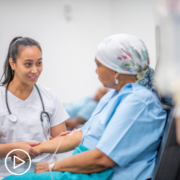Overcoming Barriers: Empowering Underrepresented Groups With Endometrial Cancer
Overcoming Barriers: Empowering Underrepresented Groups with Endometrial Cancer from Patient Empowerment Network on Vimeo.
How can endometrial cancer care barriers be overcome for underrepresented groups? Expert Dr. Emily Hinchcliff from Northwestern Medicine discusses racial and cultural barriers and advice to patients to be proactive toward receiving optimal care.
[ACT]IVATION TIP
“…know the genetic status of your tumor, specifically something called the mismatch repair status of your tumor. And then not only how does that status impact your own treatment, but also how that may impact your family members…understand what resources are out there for you as a patient, especially for women in underserved groups and minority populations.”
Download Guide | Descargar Guía en Español
See More from [ACT]IVATED Endometrial Cancer
Related Resources:

|

Innovative Approaches to Endometrial Cancer Care in Underrepresented Communities |

Endometrial Cancer Care Disparities: The Impact of Rural Residence |
Transcript:
Lisa:
Dr. Hinchcliff, in your research, you dive deeply into the significant disparities that exist within medically underserved and minority populations in the U.S. when it comes to awareness of, access to, and the use of genetic services in endometrial cancer. Can you speak to the research and provide tips to these patients and families?
Dr. Emily Hinchcliff:
Yeah, so I think that there are sort of two different pieces that go on here. First is the relationship of endometrial cancer, that some of it can be, I guess, at random, and some of it can be genetic. So understanding, especially for those who have a strong family history, that there are hereditary forms of endometrial cancer. I think that’s a really important point for patients to take away. And then we, as a society, as a field, now recommend kind of routine screening for those tests to determine, Is an endometrial cancer hereditary or not? So make sure that you, as a patient, know your results and know if your family members should be tested in any way.
The second is regarding the significant disparities that exist. We know, as a field, as a kind of medical subspecialty, that there is a racial disparity in endometrial cancer mortality. While there is a lot of research going on to address the kind of potential biologic component there, is there something different about the cancers that are developed in different racial groups? I think there’s also really important research going on about the kind of systemic and cultural barriers and differences that women of different races experience that also can dramatically impact their cancer care.
Lisa:
And do you have an activation tip for this question?
Dr. Emily Hinchcliff:
I’ll give you two different activation tips. I think that the first is to know the genetic status of your tumor, specifically something called the mismatch repair status of your tumor. And then not only how does that status impact your own treatment, but also how that may impact your family members. And then I think the second is to understand what resources are out there for you as a patient, especially for women in underserved groups and minority populations. Simply obtaining support can often be a really important key first step to gaining access and understanding of your disease.





